Megan Epler Wood

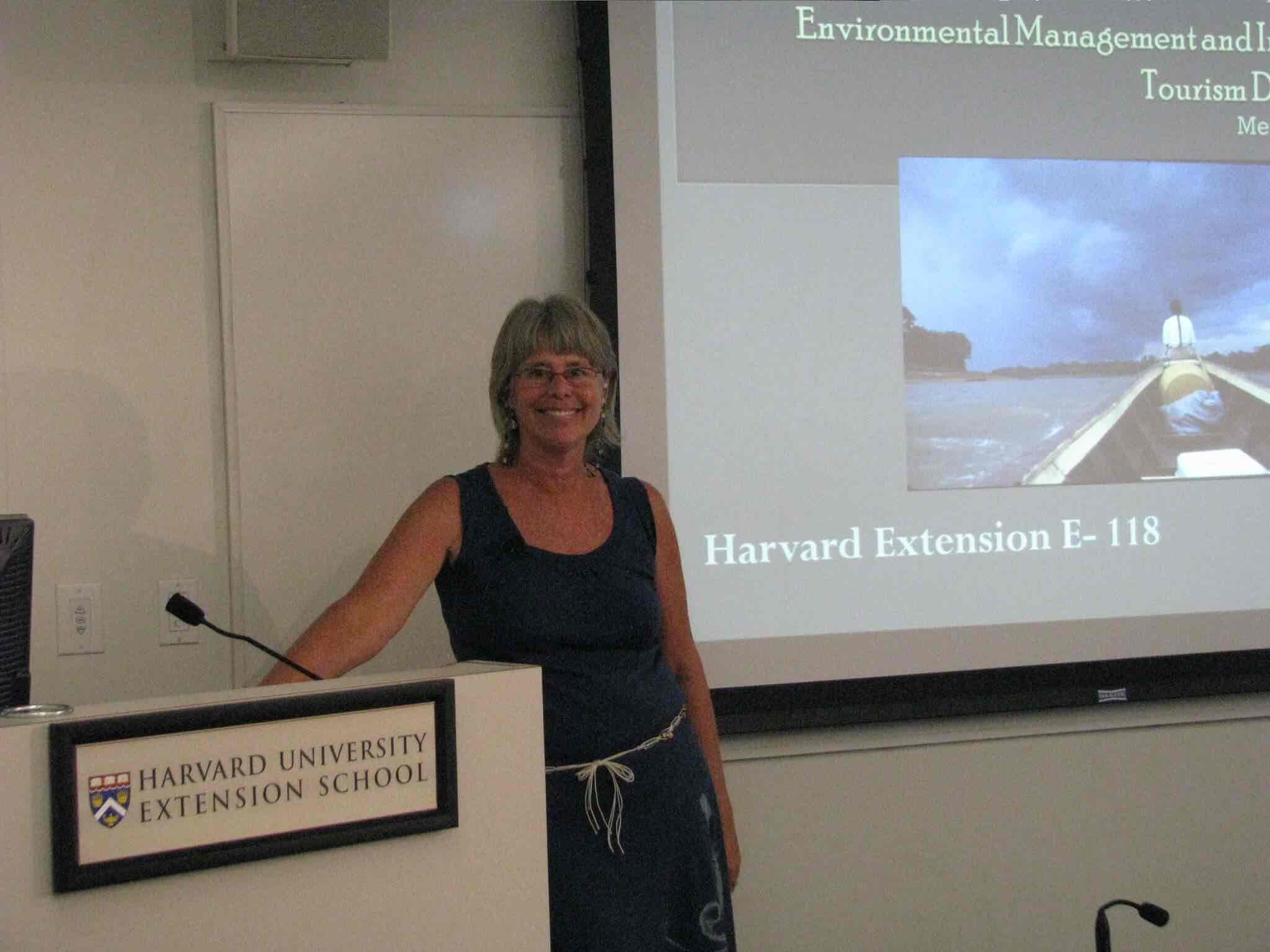
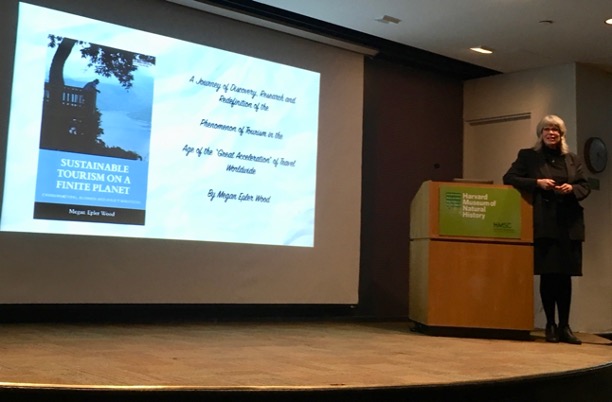



Megan Epler Wood is a dedicated educator, research analyst, and seasoned consultant in the dynamic field of sustainable tourism. With a career spanning over three decades, Epler Wood has championed the cause of sustainable practices and inclusive economic growth in the tourism sector, playing a pivotal role in shaping its course and impacting its future.
She pioneered the establishment of the first NGO dedicated solely to sustainable tourism and her initiatives and projects bear testament to her capacity for innovation, consistently evolving to reflect the ever-changing landscape of sustainable tourism and confronting the multifaceted challenges it presents.
Epler Wood has been working in the field of ecotourism and sustainable tourism since the late 1980s. She is one of the first professionals in the world to provide global leadership to help define and create the field and led research, globally vetted guidelines, and the publication of textbooks for over a decade. She began by producing the first television documentary on ecotourism for PBS in the United States, The Environmental Tourist, released on national television in 1991.
As part of that work, she undertook the research to found the International Ecotourism Society, the first NGO in the world dedicated exclusively to sustainable tourism in 1990. She created a global board and raised grants to fund an international membership and publishing program together with the Chairman of the Board, Kenyan conservation leader, Dr. David Western. Additional support was given from leaders within the World Wildlife Fund-U.S., The Nature Conservancy, Conservation International, the National Audubon Society and leading ecotourism companies worldwide. She acted as Executive Director until 2003.
The first interview with Sustainability Leaders United regarding Epler Wood's work took place in 2015. For more details on her early work, read here.
Her work evolved into a wide range of research and sustainable development tourism projects around the world via her company, EplerWood International, with the support of international agencies between 2003-2012. She then became the leader of research and education programs at Harvard and Cornell Universities, as described in this interview.
In her present role as Managing Director at Cornell University's Sustainable Tourism Asset Management Program (STAMP), Epler Wood has created a research and knowledge platform for the field of sustainable tourism with Dr. Mark Milstein, Director of the Center for Sustainable Global Enterprise to address the most pressing issues in the field of sustainable tourism. Her goal is to provide a solid set of research methodologies which can be replicated globally to address poverty alleviation, ecosystem preservation, climate change, and promote resilience in local economies, while seeking to guide the process of building sustainable communities and reinforcing biodiversity conservation.
Epler Wood's career extended into academia after two decades of work in the field of ecotourism in over 30 biodiverse countries often with leading global figures and business pioneers. She has established research and teaching programs at both Harvard and Cornell Universities since 2010. Her new programmatic work at Cornell has set out to build a strong, dedicated platform for sustainable tourism research in the decades ahead.
Her book, 'Sustainable Tourism on a Finite Planet,' was produced with over 500 Harvard student papers working across the globe. It became a text for universities worldwide and is used in an abridged for her new on-line course, Sustainable Tourism Destination Management published by eCornell in December 2022, and includes a full investigation of the tools required to manage the issues raised in her ground-breaking report, Destinations at Risk, the Invisible Burden of Tourism undertaken with the Travel Foundation.
Connect with Megan Epler Wood on LinkedIn to follow her ongoing work and contributions in the field of sustainable tourism.
Megan Epler Wood: How to Manage Tourism’s Invisible Burden and Improve Destination Management Practices
Megan, throughout your career, you have worked extensively on informing and educating stakeholders about sustainable tourism. How has your approach evolved since we first interviewed you, in 2015, and what are some of the key lessons you have learned along the way?
My early career was in science communications and conservation. I worked at World Wildlife Fund – U.S. right after graduate school. I was fortunate to be able to work with the BBC, National Geographic, and PBS to produce a range of programs on the conservation of wildlife and biodiversity. We presented topics such as biodiversity conservation in the Amazon and sustainable development adjacent to parks and protected areas in Africa among many other pressing topics led by our prestigious science team.
In the 1990s, I saw a chance to inform millions of people about the emerging field of ecotourism and grabbed the opportunity at the right moment to start the first NGO in the world, called The International Ecotourism Society, that brought together the fields of conservation science and travel and tourism.
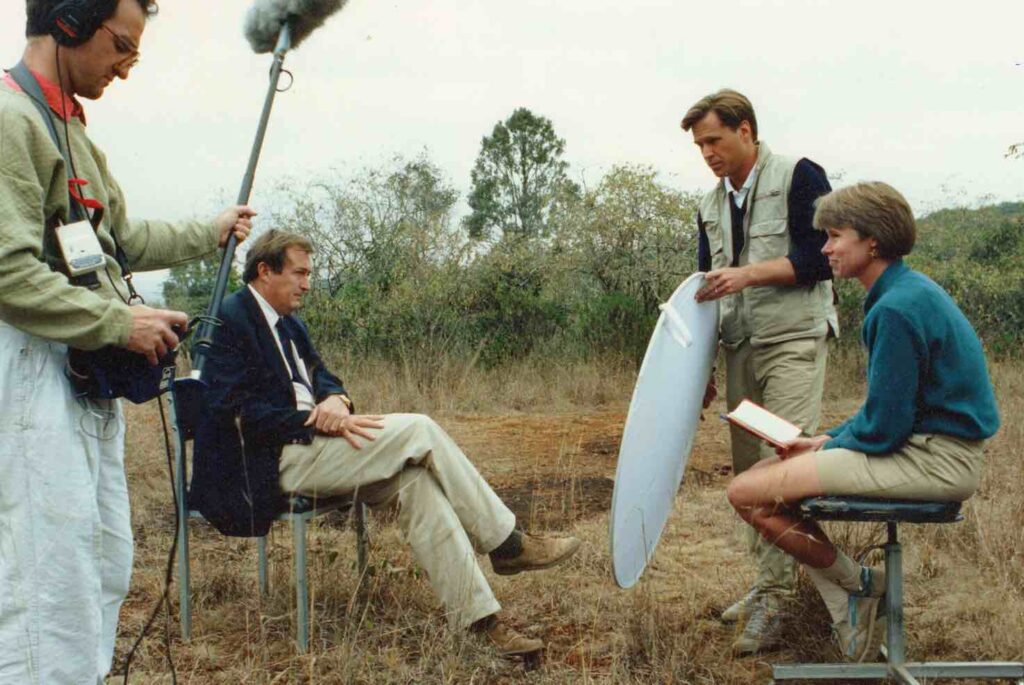
We had a powerhouse international board of experts in both travel and tourism and conservation who truly understood the long-term influence we could have by educating tourists and the travel and tourism industry of their extraordinary potential to assist with conservation goals. I never looked back!
My focus was primarily on conservation and tourism from 1990-2010. I then joined Harvard Extension as a Faculty Member in the Department of Sustainability. I decided at Harvard to look at the travel and tourism industry more holistically and specifically to investigate each of its powerhouse sectors- hotels, tour operators, airlines and airports, cruise lines, and destinations.
In my original course at Harvard, we dove into the business model of each sector and its sustainability planning programs. It led to my 2017 book, Sustainable Tourism on a Finite Planet, which outlined how the larger industry sectors operate, and why we must focus on and understand each sector to manage the tourism economy sustainably.
Once the global market became more aware of the climate impacts of tourism, this opened the door to more serious conversations about how travel and tourism economies might cope with the economic, social, and environmental threats of climate change in the 21st century.
Since 2019 and during the global pandemic, I grappled with ever-present questions about catalyzing effective programs that could be spearheaded by trained professionals. It led to a research program and roundtable at Cornell University regarding tourism management at the destination level.
The publication we wrote with support from the Travel Foundation – Destinations at Risk: the Invisible Burden of Tourism, led to a multi-year global conversation about destination management and a global speaking tour for me (partially virtual) to India, Europe, North America, Latin America, & Southeast Asia.
As the Managing Director of STAMP (Sustainable Tourism Asset Management Program), what are the challenges you have encountered in managing tourism destination assets, particularly in underdeveloped economies? How have you addressed these challenges?
Cornell STAMP was launched in 2017 via a partnership with my company EplerWood International (EWI) to offer public and private organizations in the travel and tourism sector student research on travel industry business challenges rooted in the questions of social and environmental management of tourism.
The first project we did together was in Belize, co-led by my collaborator Dr. Mark Milstein, Director of the Center for Sustainable Global Enterprise at the SC Johnson College of Businesses. At the time, EWI was tasked with consulting on an Action Plan for the Belize Tourism Industry Association to improve Quality Assurance, Internal Management Systems, Marketing, and Destination Planning.
The Cornell graduate students assigned to the project did an outstanding job uncovering a deep structural problem. At that time, the central government was collecting tourism taxes from its most “profitable destination” Ambergris Caye, and exporting a substantial percentage to less developed parts of the nation to help underwrite social, environmental, and economic development needs.
Unfortunately, Ambergris Caye could not cover its own infrastructure costs and had skyrocketing demand for sewer, water, and waste treatment. Immigrants working in the tourism trade were living in poor housing. These problems typify what we now label the Invisible Burden of tourism, and this began to guide our collaborative work at Cornell.
From that point forward, these ideas became the focus of my work. But why? Because managing the Invisible Burden of tourism on destinations offers the most holistic management opportunity to review all sectors of the industry in one location and involve local stakeholders in key decisions for the future of their nations and the planet!
What are you seeking to achieve with the new online, self-paced course on Sustainable Tourism Destination Management produced and distributed by eCornell?
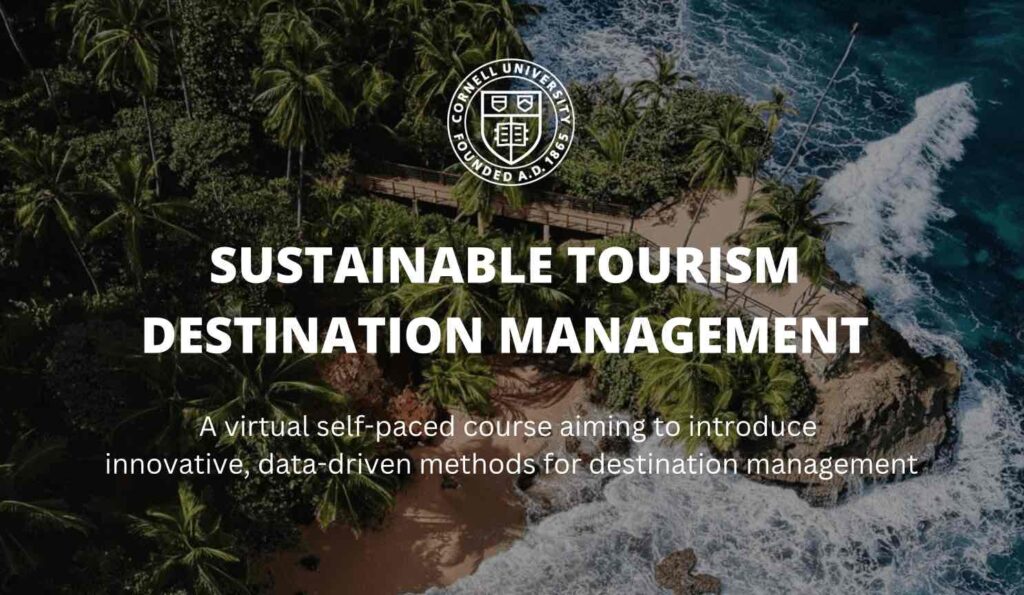
In 2022, I received a grant from GIZ to develop a 40-hour online, self-paced course for professionals and students to manage the Invisible Burden in emerging economy destinations. We teamed up with the Travel Foundation to manage the grant, and we offered the opportunity to do the course at Cornell with their digital publishing outfit, eCornell.
Once it was agreed that we would produce with eCornell, Cornell STAMP became our new home to develop this new online course. My team member and former student, O’Shannon Burns, helped me every step of the way to develop the ideas for the course. We worked closely with Mark Milstein, and he handled the agreement and co-led the course.
This led to a powerful alliance with GIZ, The Travel Foundation, and Cornell University. We are fully united on the importance of bringing affordable global education to professionals in destinations worldwide to address the Invisible Burden. Our goal is to use the 30 years of learning from global case studies and field work to bring realistic systems and metrics to the destination management world.
How do you envision the outcome of the global scholarship program that is now being offered, together with the Travel Foundation, for the Sustainable Tourism Destination Management course supported by GIZ?
GIZ and Travel Foundation have worked very hard to ensure many opportunities to take this course, and GIZ funded 1000 scholarships as part of our grant. At Cornell STAMP, we established a portal that allows students in qualified countries to apply for the course without cost. At the moment, the portal is open for applications until July 31, 2023. More opportunities will arise in the future as well.
Our goal is clear. We are addressing a global skill gap in the field of destination management. The tools and skills to manage tourism’s valued destination assets must be learned and cannot be reinvented with each new round of planning. Local units must begin benchmarking with skills on hand to prevent degradation and foster inclusive development if we want to play a sustainable or regenerative role.
At present, a very low percentage of sustainability plans for destinations are implemented. It must change.
During your time as a research director and faculty member at Harvard University, what were some of the most impactful insights or ideas you shared with your students regarding sustainable tourism? How have their perspectives and approaches evolved?
My students came from all over the world. I remember many cases where I read their papers and felt deeply moved.
One paper was about tourism growth on the coast of Brazil and the rapid build-up that displaced defenseless people who were fishermen and local villagers. The infrastructure built for tourism was cheap and inadequate for the growing population. The workers who immigrated for work settled in shanty towns, leaving the Brazilian city with an Invisible Burden that lowered their quality of life terribly.
As we worked, my Teaching Assistants and I had strict research protocols, which trained our students to carefully isolate problems and base their conclusions on quantitative data whenever possible. They learned to gather data on economic, social, and environmental metrics relevant to the sector of the industry they were working on. Because of these research protocols, we had revelation after revelation about important gaps in data in tourism destination management. Our recommendations were often very compelling, as we were revealing problems not being measured or managed locally.
I had over 500 students at Harvard, and nearly all of them found the tourism economy to be an unusual case, an outlier because of its lack of ability to respond to sustainability management issues. I continue to try to see if this can be rectified.
In 2015, I became the Director of the International Sustainable Tourism Initiative (ISTI) at the Harvard Center for Health and the Global Environment under Dr. Jack Spengler. We received a grant from GIZ to study how to create measurable metrics to provide the information required to improve destination management on Djerba Island in Tunisia.
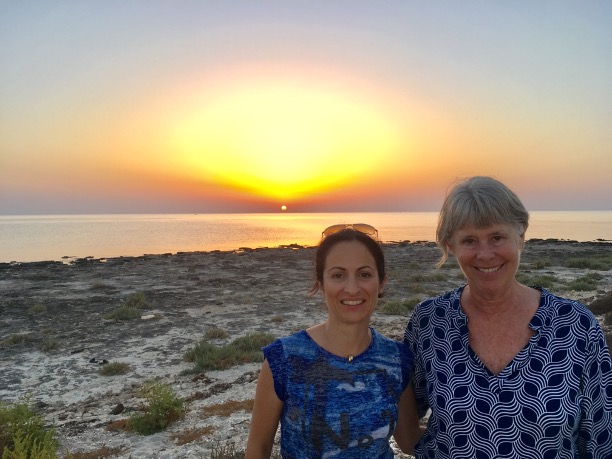
Our ISTI Research Manager, Sofia Fotiadou, a former student of mine from Harvard Extension, formulated the Holistic Environmental Accounting for Destinations (HEAT-D) system for local government and tourism management organizations to measure climate emissions together with invaluable graduate students, Zain Jarrar from Harvard Kennedy School of Government and Misbath Daouda from the Harvard School of Public Health.HEAT-D is a monitoring system that measures resource use, quantifies environmental impacts, identifies greenhouse gas (GHG) emissions related to tourism, and monitors the transition of the tourism sector to a green economy.
We knew if we could train professionals to do local climate-related accounting of this type, we could begin to tie the mushrooming travel economy to meaningful metrics at the local level. It would drive national and regional governments to measure and manage the impacts of tourism in a replicable fashion to create usable data for transitioning infrastructure to more climate-resilient GhG emissions models per tourist.
Your book, “Sustainable Tourism on a Finite Planet” provides a comprehensive review of sustainability practices in the tourism industry. Since its publication, have you witnessed any significant shifts or advancements in adopting these practices? Are there any areas where you believe more progress is needed?
I don’t think the book provided the means to change practices, unlike my more current work. What it did do was demonstrate how the global tourism economy functions. Before I wrote it, I dealt with many academics and colleagues who did not understand the full tourism economy and its sectors. Many confuse it with the hotel economy, which is only a portion of the travel and tourism economy. My goal was to set out a comprehensive view for students of how the tourism economy functions, its supply chains, its management systems, and its dynamic and pivotal sectors. I am told there is no other book like this, and students still use it worldwide.
Eighty percent of tourism education is presently dedicated to hotel and hospitality management, according to a UNWTO study. There is a tremendous gap in travel and tourism education. A more thorough and holistic form of travel and tourism education is urgently needed. For example, aviation and aviation sustainability rarely receives the attention required, and despite their enormous importance, there are very few academic programs dedicated to this part of the tourism economy.
The report you authored, “Destinations at Risk: The Invisible Burden of Tourism” highlights the unaccounted costs of managing tourism at the local level. Can you share some specific examples or case studies that illustrate these hidden burdens and their impacts on destinations?
I still remember reading Tourism Concern’s publications about how local people in Zanzibar began to cut water lines to local hotels to preserve their wells. This research helped pioneer other reports and investigations into the heavy overuse of local resources caused by tourism growth.
In Bali, an NGO revealed that salt water was filtering into the watershed in heavy tourism zones leading to dangerous salination of vital freshwater sources. On Djerba Island in Tunisia, the locals protested having waste from hotels burned near their community until a new solid waste site was finally established.
Many instances have been found where trash or sewage is improperly disposed of by tourism destinations throughout the world. Only 8% of low-income countries have wastewater services as of 2017, making any proper disposal very difficult. It can lead to problems such as the closure of Boracay Island in the Philippines in 2018.
Tourism will inevitably place heavy burdens on such poor infrastructure systems, and planning for tourism must include sustainable infrastructure planning in the future. It is an important objective of our new Cornell course.
With your international consulting firm, EplerWood International, you have worked on numerous sustainable tourism development projects worldwide. Could you describe a project that you consider particularly impactful or successful and explain why it stands out?
The EplerWood International approach with our clients was always based on developing a solid business planning model that relied on local business expertise and the protection of socio-cultural and environmental resources.
For years, international agencies that funded ecotourism development sought to invest directly in local community ecotourism projects in remote regions by financing some equipment and workshops. Their intentions were good. Their goals were to use ecotourism as a means to provide livelihoods for local people while financing global conservation and biodiversity conservation goals. But these projects were rarely based on the business case for these investments.
My team would always begin with business planning analysis and feasibility work, and seek to help capitalize tourism projects to become self-sustaining business enterprises in the medium to long term. We introduced more business-oriented planning to ecotourism development programs in countries such as Bangladesh, Sri Lanka, El Salvador, and Sierra Leone.
Most of my beloved local counterparts wanted to continue working on the projects, but local skills in business development in this unique field were generally low. In some cases, very experienced local businesses stepped in and took over the ecotourism business programs we developed. This was important progress but required more support and business investment. This is why education in sustainable business became my growing passion.
My current passion is destination finance. There was a moment in time, which will return when companies will work with destination authorities and outside financing groups to undertake concessionary finance programs to upgrade and improve destinations, to both maintain value and invest in national assets for the future.
I am seeing a unique set of public-private financing efforts that are bearing fruit already in Rwandan parks, which I believe is replicable. It is part of a study we are doing in 2023 on Tourism and Conservation for Cornell STAMP, funded by the Mastercard Foundation, to be released in 2024 in Kigali, Rwanda.
As a thought leader in sustainable tourism, what are some of the pressing questions or issues you are currently focusing on in your research? How do these questions relate to the future of sustainable tourism management?
I would say governance is what needs more research. While destination marketing organizations have good intentions to incorporate sustainability, there is a need for new structures of government that designate trained units to manage tourism sustainability.
I still remember telling a colleague of mine, Dr. Henry Lee, at the Harvard Kennedy School of Government that tourism marketing units or DMOs were frequently paid for by tourism taxes and generally governed by industry-heavy tourism boards. He said, “Megan, you have a problem there.” This problem is still very grave.
Given your wealth of experience, what advice would you give to destinations, businesses, and governments looking to embrace sustainability in their tourism practices? And are there any emerging trends or innovative approaches that you believe hold great potential for driving positive change in the industry?
In this period of growing peril from climate change, I believe we need to be very realistic. I know folks want to see more promise and the ability to move beyond the old term of sustainability. I would be happy to embrace that, but the technical work involved in measuring and managing the impacts of travel and tourism has already received decades of research in the field of sustainability. We need to use it, or we will not lower our impact anytime soon.
I believe that we must look first at improving local infrastructure, and it must happen as part of the global effort represented by the Bridgetown Initiative. I bring this up because it is the most concrete call for collective action to lower the cost of managing climate mitigation for developing economies I have read, something I believe our travel and tourism world should be deeply committed to. To quote the founding document,
Most climate-vulnerable countries do not have the fiscal space to adopt new debt. We must move beyond country-by-country. We need a global mechanism for raising reconstruction grants for any country imperiled by a climate disaster. And we need a new issuance of 500 billion SDRs (US$650 billion) or other low-interest, long-term instruments to back a multilateral agency that accelerates private investment in the low carbon transition, wherever it is most effective!
I agree, and I simply want to reinforce this effort which could be dedicated in part to creating a more resilient and lower emissions travel and tourism economy in emerging and developing economies worldwide.
Thank you so much, Megan.
EplerWood International (EWI) is a transformative force in the world of sustainable tourism, empowering destinations to cultivate value-added economies that prioritize enhanced local well-being and environmental preservation.
With a history dating back to 2003, EWI has made a significant impact, successfully executing destination development projects in over 30 countries. The firm's impressive track record serves as a testament to the profound benefits of investing in sustainable tourism economies. Through its efforts, natural resources are conserved, local communities witness improved income and infrastructure, and valuable social and environmental business opportunities flourish.
EWI's comprehensive range of services for tourism destinations includes:
- Speaking & Destination Evaluation: EWI's captivating speaking engagements initiate a meaningful dialogue with local stakeholders, while destination evaluations offer valuable insights into the specific needs and challenges of each destination.
- Sustainable Destination Management: Leveraging its extensive expertise, EWI provides innovative strategies for destinations to manage tourism sustainably, ensuring long-term success and positive impacts.
- Destination Recovery Investments: In times of crisis, EWI supports destinations in their recovery efforts, offering valuable guidance and investment solutions to rebuild and thrive sustainably.
- Ecotourism: Business Development & Field Engagements: EWI fosters the growth of ecotourism enterprises and engages on-the-ground to cultivate responsible tourism experiences that benefit both travelers and local communities.
With EplerWood International as a trusted partner, tourism destinations gain access to a wealth of knowledge, experience, and passion that ensures their journey towards sustainability is both rewarding and impactful.
More about Epler Wood International on https://eplerwood.com/
Climate Action Commitment
EWI recently completed its first Climate Action Report for 2022 as a signatory of the Glasgow Declaration on Climate Action in Tourism.
The company will annually review its GHG emissions reductions, working at the destination level, and tracking its footprint within its headquarters at the City of Burlington, Vermont, US, and internationally. The full report explains reductions in fossil fuel use, transportation issues and measures to reduce air flight impacts for the company, as well as goals for decarbonizing and regeneration.
Find out more about EWI's Climate Action Report for 2022 here.
Megan Epler Wood brings three decades of expertise as a thought leader, educator, and consultant. Founder of the first NGO devoted to sustainable tourism and leader of impactful projects worldwide, Megan captivates audiences with her engaging talks and enlightening presentations. With a keen focus on sustainability practices, environmental management, and regenerative tourism, she addresses the challenges of managing tourism post-COVID-19.
Megan is available for keynotes, panel discussions and coaching sessions, empowering tourism businesses and communities.
Speaking Topics:
- Sustainable Destination Management: Building the holistic strategies, tools, training and investment required to manage the growth of sustainable tourism
- Regional Planning for Managing the Invisible Burden of Tourism: Creating a public private, tax-based system for managing the Invisible Burden of tourism
- Developing Diverse Supply Chains for Sustainable Tourism: Creation of resilient, locally run sustainable tourism business development strategies
- Creating Destinations that Conserve & Contribute to Biodiversity: Policies to leverage protection of wildlife and biodiversity while fostering local well-being
- Facing the Facts; Creation of Sustainable Tourism Policies in the Face of Rapid Climate Change: Developing Strategies to Lower Risk in Prime Destinations Worldwide
Megan's speaking engagements serve as a crucial first step in engaging local stakeholders, evaluating destination needs, and sharing essential tools and frameworks that shed light on key issues within tourism destinations. Her presentations often pave the way for deeper relationships with clients, facilitating productive conversations around tourism planning, governance, and sustainable development.
Whether as a keynote speaker or coach, her insights empower businesses and destinations to make lasting, positive impacts in the world of sustainable tourism.
Testimonial
"Megan Epler Wood was invited to Banff National Park in April, 2019 to deliver a speech on Tourism's Role in Protecting Earth's Most Valued Assets. The presentation illustrated the need for destinations around the world to begin to develop measured responses to congestion and extensive use of critical resources, both in cities and in natural areas, to ensure the future sustainability of economic, social and environmental systems. Our local planning community found the material to be on target as they move towards crucial decisions for our region."
Megan Epler Wood's contributions to the world of sustainable tourism extend beyond her dynamic public speaking and transformative consulting work. As a prolific writer, she has authored influential publications that have shaped the discourse on sustainability, leaving a lasting impact on the industry.
 Sustainable Tourism on a Finite Planet
Sustainable Tourism on a Finite Planet
2017 | Megan's seminal book, "Sustainable Tourism on a Finite Planet," serves as a comprehensive guide that systematically reviews sustainability practices in each sector of the tourism industry. This globally adopted textbook is a source of inspiration for the next generation of sustainable tourism leaders, emphasizing the urgency and importance of sustainable practices in the face of finite resources.
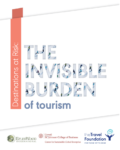 Destinations at Risk: The Invisible Burden of Tourism
Destinations at Risk: The Invisible Burden of Tourism
2019 | As a lead author of "Destinations at Risk," Megan sheds light on the unaccounted-for costs of managing tourism at the local level. This ground-breaking report calls attention to the hidden burdens that destinations bear due to tourism's impacts on infrastructure, resources, and communities. By uncovering these challenges, the report offers insights to develop more sustainable tourism models.
Megan Epler Wood's publications go beyond theory, offering actionable solutions and frameworks for achieving sustainability in the tourism sector. These books serve as valuable resources, guiding destinations, businesses, and policymakers in their journey towards a more responsible and regenerative approach to tourism.

